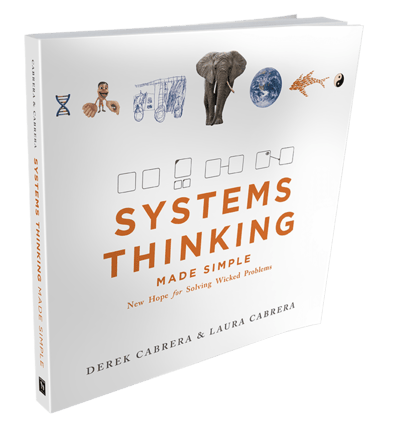Systems Thinking Made Simple
Best-selling, award-winning, page-turning, dog-earing.
About the Book


Systems Thinking Made Simple (STMS) is an accessible and scientifically sound guide on how to become a systems thinker for the general public. Heralded as a milestone in the field of systems thinking, STMS won the AECT outstanding book award. STMS is also used as an introductory textbook at universities worldwide and at prestigious institutions like the United States Military Academy at West Point and Cornell University, where the authors teach systems thinking, mapping, and leadership.
Systems thinking can help you solve both everyday and wicked problems to increase your both personal effectiveness and to transform your organization. This book is for anyone interested in learning the foundational ideas of systems thinking. Many experts and practitioners in the field of systems thinking have embraced this work as easy to understand, and even easier to use to solve problems, gain success, and improve your life.

Hear from People Who Read It

“A must-read for those in workforce development and higher education, Systems Thinking Made Simple teaches us how to be better, more systemic thinkers in a way that applies equally well to classroom and boardroom. The Cabreras show us how to fill the pipeline from higher education to the workplace with systems thinkers. If you’re not developing your student body or workforce into system thinkers then you’re not getting the most out of your human talent.”


“Applying the science of systems thinking to our business models and practices has transformed everything we do. In particular, applying this revolutionary approach to defining our company’s Vision and Mission statements keeps our whole company focused on those two critical things (V&M) by using and understanding Culture and Learning. I would highly recommend this work to any company regardless of size or
maturity.”
Book Reviews
"Systems Thinking Made Simple makes a significant contribution to the interrelated fields of systems thinking, sustainability education, and cognitive science. This is a worthwhile book to read, to have by your side as you practice the skills and tools introduced in the book, and to share with others. I extensively use the strategies and tools included in Systems Thinking Made Simple. I use DSRP with students and educators to map our thinking and knowledge of issues. Using DSRP leads to deeper understanding. It also makes our thinking transparent and we can work toward building shared mental models of an issue. Overall, this book is well written, is not overly dense or academic, and provides the information for us all to be better systems thinkers. And, most importantly to me, it shows how I as an educator can integrate teaching thinking (systems thinking) into what I do. No longer is thinking some black box in which some magic would happen. I can understand what thinking is, how people build knowledge from information using DSRP, and help to build people’s thinking skills. And, we can all apply systems thinking in our everyday lives, to complex issues we are facing as a society, and to the organizations within which we work and learn."
-Jeremy Solin, Excerpt from Book Review of Systems Thinking Made Simple: New Hope For Solving Wicked Problems
"As the authors explain, the book presents the material in a way that can be used to teach systems thinking to elementary school children, teenagers, CEOs, all types in between, and beyond. The style is not scholarly, yet, it achieves a well-defined scholarly position, and there are numerous footnotes for those needing the background material. The intent is to be accessible by all. The authors describe how to use the simple rules (DSRP) and how the use helps develop better mental models of the world. A better model in this sense is not necessarily more detailed, but is more faithful to the way the world actually works. It is an easy step from the consideration of the plethora of wicked problems to the realization that we need many more systems thinkers. The authors’ aim is to explain how to become systems thinkers, develop systems thinking organizations, and solve wicked problems. My recommendation: “relax and enjoy this book, but be ready to be challenged and enlightened.”"
-Richard F. Emerson, Excerpt from Book Review of Systems Thinking Made Simple: New Hope For Solving Wicked Problems
About the Authors

Derek Cabrera, PhD
An internationally known author and systems scientist and serves on the faculty of Cornell University and the Board of Advisors DSE at the US Military Academy at West Point...

Laura Cabrera, PhD
An expert in research methods and systems thinking, Laura serves on the faculty of Cornell University where she teaches systems thinking, mapping, and leadership...
.png?width=1500&height=1500&name=CRL%20GOAT%20Logo%20(5).png)